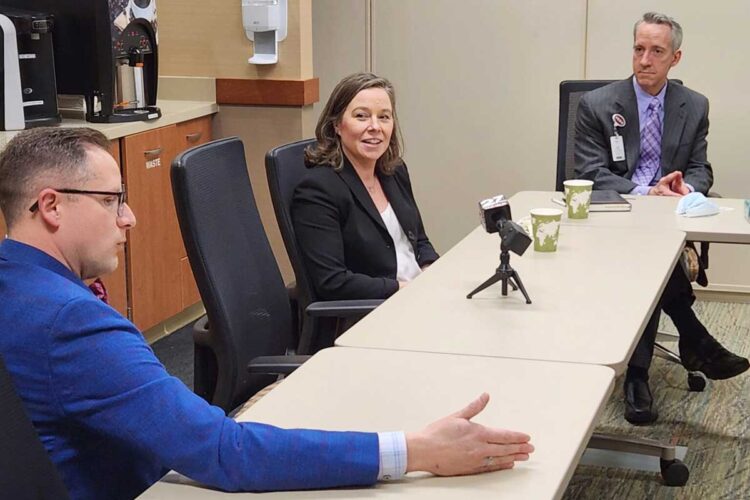Lt. Gov. Sara Rodriguez said she believes lawmakers will be more flexible in considering whether Wisconsin will be the last state to embrace federal Medicaid expansion as a new Legislature elected under Wisconsin’s new voting maps takes office in January. Dr. Nathan Grunewald, a urologist who grew up in Sauk County and returned to practice at Sauk Prairie Healthcare, spoke with Rodriguez in January about concerns about recruiting and retaining health care workers. (Eric Gunn/Wisconsin Examiner)
Governor Tony Evers’ Healthcare Workforce Task Force released recommendations Monday to address the state’s health care workforce challenges now and in the coming years. The task force’s recommendations sought to address three problem areas: education and training, recruitment and retention, and regulatory policy.
Gov. Evers formed the task force in January after declaring 2024 the Year of the Workforce in his State of the State report. The 25-member group of cabinet members and health care experts was tasked with developing proposals to help shape the health care and workforce agenda for the state’s 2025-27 budget.
“While Wisconsin has historically low unemployment and record employment, our decade-long struggle to attract, retain and train qualified workers to address labor shortages in key industries has hindered our state’s growth.” Evers said in a statement. “This action plan will help welcome more people into the health care workforce and ensure Wisconsinites get the care they need and the quality of life they deserve.”
Ensuring the workforce can meet the needs of the economy is one of Evers’ top priorities. “It has to be a top priority for the state, including the Legislature.”
“I look forward to considering these recommendations together in the next biennium budget.” Evers said in a statement.
The task force’s chair, Lt. Gov. Sara Rodriguez, who was an emergency room nurse and worked in health policy and public health before entering politics, said at a press conference that Wisconsin could face a shortage of 20,000 nurses by 2040, and noted that other roles in the industry are also facing nursing shortages.
“This includes licensed practical nurses, surgical technicians and all other support roles. It’s really important that these positions are filled as well so that our nurses, doctors and other clinicians can do their jobs.” Rodriguez said. “We started there and looked at what are the core areas we want to improve within Wisconsin.”
With regard to education and training, the report recommends improving support for faculty who teach health professions by expanding incentive programs for health professions educators and increasing compensation for health professions faculty, enhancing clinical training and experiences, reducing barriers to training, expanding apprenticeships and other learning opportunities, providing additional state funding for apprenticeship programs, funding Workforce Improvement Initiative grants, and increasing student access and dual enrollment in health sciences (which allows high school students to complete postsecondary courses and earn certifications and licensure).
Rodriguez said he wants the state Legislature to take the lead in creating an apprenticeship model for clinician education.
“We’re one of the first states to do this for nurses within UW Health, where we hire certified nursing assistants, pay them a full-time wage and benefits, pay for school tuition and allow nurses to earn their registered nurse degree debt-free.” Rodriguez said. “This is a really great and innovative way to apply the apprenticeship model, which Wisconsin has always been proactive about, to our health care workforce.”
The report offers three recommendations to improve recruitment and retention.
One proposal includes expanding Medicaid to provide more support for recruitment and retention to support health care workers and fund workforce initiatives. Part of the proposal would support rate increases to cover increased costs for Wisconsin’s elderly and disabled care and behavioral health workers. Another proposal would expand state incentives, including loan repayment, housing assistance and provider benefits, for health care professionals working in state-defined shortage areas. The final proposal aims to support local innovation through grant funding.
The Task Force also recommended expanding pathways to licensure by approving Medicaid reimbursement for doulas, community health workers, peer specialists, and other community-focused providers, ratifying and concluding multistate licensure agreements, opening licensure paths to qualified internationally educated professionals, and revising faculty education requirements. It also recommended increasing health promotion programs for health care providers.
Rodriguez said the state’s budget surplus creates an opportunity to fund some of the recommendations. “If we do this, we will have an economy that works for everyone.” She said.
Rodriguez said the recommendations will be sent to Governor Evers for state budget consideration and that financial estimates for each recommendation will be prepared by the State Budget Office. He also noted that Medicaid expansion could help cover the costs of the proposal.
The state could potentially access $1.6 billion in federal funding by accepting federal Medicaid expansion funds, but the state Legislature has so far rejected the idea.
“One of the recommendations we’re making is to expand Medicaid in Wisconsin. Right now we’re one of 10 states that haven’t expanded Medicaid, and we have the unique distinction that if we did expand it, we would actually save money just in the general fund…” Rodriguez said. “We’re not only looking at items that could be fiscally burdensome, but a lot of the revenue that we’re going to get from expanding Medicaid in Wisconsin could be reinvested in our workforce and our health care system.”
Republicans in the state legislature have blocked Wisconsin from accepting federal Medicaid expansion, despite Governor Evers’ lobbying to receive federal funding since taking office in 2019. By raising the Medicaid cap to 138% of the poverty level, Wisconsin would receive a total of $1.6 billion in federal funding over the next two years.
Rodriguez said he believes that with a new state legislature elected based on Wisconsin’s new voting maps taking office in January, lawmakers will be more flexible in considering whether Wisconsin should be the last state to accept the federal Medicaid expansion.
———
The Wisconsin Examiner is part of States Newsroom, a national 501(c)(3) nonprofit organization. For more information, visit https://wisconsinexaminer.com.

